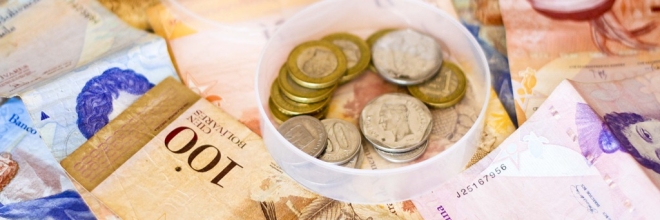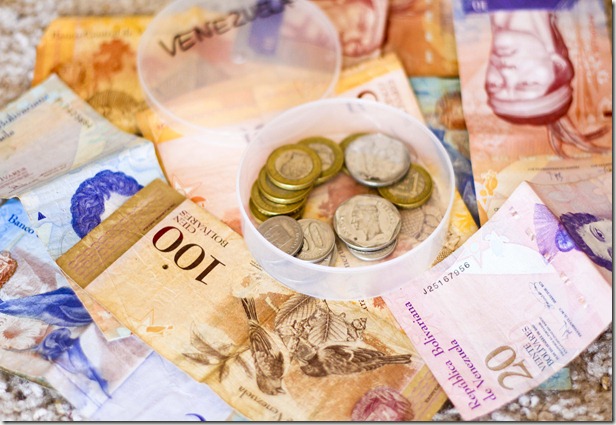Getting Money in Venezuela

Getting cash in Venezuela is an art form. The official exchange rate between US Dollars and Venezuelan bolívares is approximately 6.3 VEF per 1 USD. The UNOFFICIAL rate is currently around 88 VEF per 1 USD*. This makes for a lot of fun trying to figure out how much money you have, how much you have spent, and how much you can get.
Everyone says never to travel with more than a couple hundred in cash. This is most true in the ridiculously high crime-country of Venezuela. What you aren’t told, is once in the country, it is highly unlikely you will find any bank who will take your bank card. If you do happen to stumble upon someone who is able to get cash (at the official rate) from a bank machine, you can try the same machine, with a card from the same bank, and be denied money.
Welcome to Venezuela!

The best way to get money, and get it at a rate better than 6:1, is the black market. Of course, saying “Oh, just exchange money on the black market” is a whole lot easier said than done, especially since you have no idea what the black market is, where it is, or what it means.
1. The Black Market is not a place.
There is no secret underground place you meet shady looking, Deep Throat-esque characters who exchange your money for you. The best thing here is either ask the family you are staying with (which I highly recommend Couchsurfing, especially in Caracas). They live there. They will know exactly what the black market is and be able to exchange money for you at the unofficial rate or close to it. You may not understand the mechanics behind this, but it doesn’t really matter…you are getting double the official rate.
2. If you are staying in a hotel, ask the reception.
They commonly deal with foreigners who unexpectedly discover that their bank cards don’t work, and that all the hidden ‘taxes’ you must pay at bus stops, ferries and airports…taxes you must pay IN VENEZUELAN CASH…quickly add up. You will get stuck. Suddenly you are almost out of money with no way to get more. Hotels deal with this all the time. They almost always have an offshore account in the USA or Europe that you can wire transfer money into, and then they will hand you bolívares. This is usually done at a rate slightly lower than the black market rate, but much better than the official one.
Getting money through hotels is safer than doing it yourself on the street. But if you feel like you are being taken advantage of, feel free to haggle or shop around.
This is slightly less than the ‘official’ unofficial rate, but you have to remember: the Venezuelans helping you, are the ones illegally laundering money, and they have to pay the international wire transfer fees, bribes, and whatever other ways they get cash for you.
3. Try asking at tourism agencies.
Tourism agencies can help, but sometimes you have to look around for them. Some will not, or put up a fight about dealing with the hassle. If you are totally stuck, be polite, subtle, persistent, or even beg. If they still refuse (which is their right) try asking if they ‘know someone who can help’. There is always a way to get money.
Tourism agencies will likely offer you a lower rate than hotels. How desperate you seem, or how quickly you need money, will likely determine the rate they offer.
Since getting money in these ways is openly accepted yet totally illegal, I am not going to mention anywhere specific that did this for me when I was in Venezuela. All I can say is read this blog. I never used a tourism office (but a couple who I met on Margarita Island did and got about 1/3 more than the official rate, but they were desperate and needed the money asap to get to where they knew of a bank that would work for them).
The only other suggestion I can give you, is to bring a couple of thousand dollars in cash in US dollars , Euros, or Pounds. (Not everywhere will take Euros by the way). But with the immense crime rate, and a likely desire on your part to NOT get robbed, raped and murdered, this is not a smart idea. You should bring about 200-500 cash with you. I brought 200USD and it was gone in a couple of weeks. Venezuela is not that cheap. It’s surprisingly expensive compared to Colombia and Ecuador.
Whenever you can, PAY IN CASH. If you buy anything with a debit/credit card (which this is usually acceptable in most retail and larger stores), stores will charge you at the official rate. If you use cash bought on the black market, that same purchase will cost you half as much.
Venezuela is beautiful and since Chavez’s passing, the both the black market and official rate have gone down (in our favour). If you plan on going to Venezuela, you will save a lot of money by buying on the black market!
I would like to thank those who helped save my butt and exchanged money for me in Venezuela. You know who you are. A big kiss to all of you!
*UPDATE: This post was originally posted in 2012, but has been updated with more current exchange rates, as of fall of 2014. Also, the current code for Venezuelan Bolivares is now VEF. Always check the local ‘official’ rates online and Google the current unofficial rates before your trip to Venezuela.
About Dani Blanchette
I am a freelance travel and music photographer and creator of GoingNomadic.com.
I love music, food, and exploring cities without guidebooks. I’ve flown a helicopter, hitchhiked down the east coast USA, and once snuck into the back of a zoo (in Serbia) and pet a lion.
I am always up for an adventure, and sometimes I videotape them.
